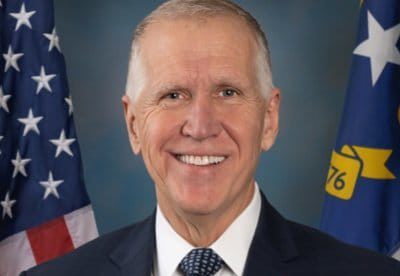Sen. Thom Tillis (R-N.C.) has made a significant and controversial call for President Biden’s cabinet to invoke the 25th Amendment following what he described as a “painful” debate performance by the President. The debate, which took place on Thursday, featured Biden and former President Trump and has sparked concerns regarding Biden’s cognitive abilities and overall fitness for office. Tillis, a member of Senate Minority Leader Mitch McConnell’s (R-Ky.) leadership team, expressed these concerns in a letter to the Senate GOP conference, stating that the President’s inability to articulate his policies and respond coherently raises serious questions about his capacity to lead the nation, especially during critical moments of national security.
In his letter, Tillis urged the cabinet to act if Biden does not voluntarily step down, highlighting the importance of ensuring that the President is capable of performing his duties effectively. Tillis emphasized that Biden’s decline appears more severe than previously acknowledged and criticized the White House for lacking transparency regarding the President’s condition. Tillis’s appeal reflects broader concerns within the Republican Party about Biden’s ability to handle the responsibilities of the presidency in the run-up to Election Day.
Bipartisan Concerns and Political Implications
Thom Tillis’s call for the invocation of the 25th Amendment marks a notable moment in U.S. political discourse, as he is recognized as one of the more bipartisan figures within the Republican conference. His involvement in various key negotiations throughout Biden’s term lends weight to his concerns. Tillis’s stance has been echoed by other Republicans, including Speaker Mike Johnson (R-La.) and Rep. Chip Roy (R-Texas), who have also expressed doubts about Biden’s capability to continue serving as President.
Speaker Johnson, while not as forthright as Tillis, suggested that the cabinet should at least consider the 25th Amendment as an option. Meanwhile, Rep. Roy has announced plans to file a resolution urging Vice President Harris and the cabinet to declare Biden incapable of fulfilling his presidential duties. These developments underscore the growing bipartisan unease regarding Biden’s performance and health, which could have significant ramifications for the upcoming election and the broader political landscape.
Biden’s Response and Campaign Resilience
Despite the mounting pressure and scrutiny from Republicans, President Biden’s campaign showed no signs of slowing down. On Friday, Biden appeared at a rally in North Carolina, where he candidly addressed the concerns about his health and capabilities. Acknowledging his slowed physical and verbal performance, Biden reassured his supporters of his commitment and ability to perform the duties of the presidency. He emphasized his experience, knowledge, and dedication to the job, portraying himself as a resilient leader who understands the challenges and responsibilities of the role.
Biden’s response at the rally in Raleigh highlighted his awareness of the criticisms but also reinforced his determination to continue serving. By addressing the concerns head-on, Biden aimed to reassure voters and counter the narrative of his declining fitness for office. His remarks underscored a message of resilience and perseverance, key themes that his campaign will likely continue to emphasize as they navigate the final months leading up to the election.
Senator Tillis Criticizes President Biden’s Cognitive Decline
Senator Thom Tillis expressed serious concerns about President Biden’s cognitive and physical decline, following a recent rally and debate. Speaking to The Hill, Tillis highlighted that the events only heightened his fears regarding the president’s current state and his capability to handle critical situations. The senator pointed out the potential risks involved if Biden were to face an “existential threat in the Situation Room” given his perceived decline.
In his commentary, Tillis wrote, “It was painful, and I truly feel bad for President Biden. Cognitive and physical decline is a normal part of the aging process for many people. But displaying that decline in front of hundreds of millions of Americans is most certainly not normal, especially when your day job is serving as the nation’s commander-in-chief.” His statements reflect a growing concern among some lawmakers about the president’s fitness to serve and the potential implications for national security.
Implications of the 25th Amendment on Presidential Succession
The 25th Amendment to the U.S. Constitution provides a mechanism for addressing presidential incapacity. According to this amendment, if the vice president and a majority of Cabinet members determine that the president is “unable to discharge the powers and duties of his office,” they can vote to transfer those responsibilities to the vice president. This process ensures that the country remains under stable leadership even in cases where the sitting president cannot perform their duties.
However, if the president contests this determination, the issue would then be resolved by Congress. A two-thirds vote in both the Senate and the House of Representatives is required to grant the vice president the presidential powers. This procedure underscores the importance of congressional consensus in matters of presidential succession and ensures a thorough evaluation before any transfer of power is finalized. The debate over President Biden’s capacity has thus brought renewed attention to the 25th Amendment and its critical role in maintaining governmental stability.














